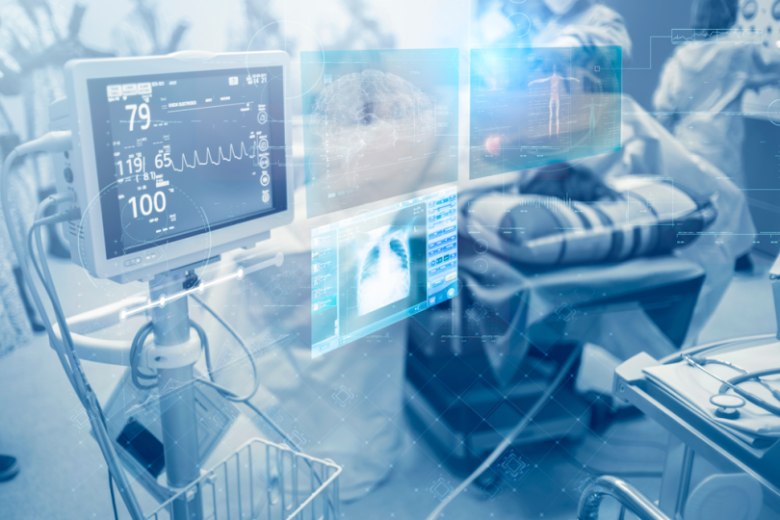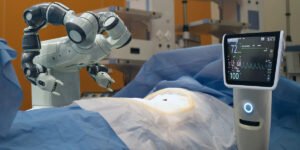In emergency medical care and critical care, every second counts because everything happens quickly. Making the right choice quickly can be a matter of life or death. As technology continues to develop, artificial intelligence (AI) is changing the game in these stressful situations. Artificial intelligence is transforming emergency medicine and critical care, making the screening process faster and more accurate and giving doctors and nurses tools that can save lives. This article discusses the many ways artificial intelligence can quickly address the challenges in emergency medicine and critical care, ushering in a new era of efficiency, accuracy, and better patient outcomes.
How Important is Emergency Medicine?
1. Make Important Choices
In emergency care, you have to make decisions very quickly. In the emergency room, doctors and nurses must quickly assess patients, prioritize cases based on importance, and initiate appropriate treatment for the best outcome.
2. Patients with Condition Changes
In an emergency situation, a patient’s condition often changes quickly and is unpredictable. The diversity of cases, from trauma cases to acute illness cases, means that assessment and treatment must be flexible and adaptable.
3. Make the Most of Resources
In the event of an emergency, it is very important to make good use of resources such as personnel, tools and medicines. Making the most of the resources available to you can directly impact the level of care you receive.
Artificial Intelligence is Entering Emergency Medicine:
1. Optimize Triage
Artificial intelligence improves the screening process by quickly looking at patient data to determine which cases should be addressed first. Algorithms can group patients based on the severity of their condition so that the most important cases receive urgent care.
2. Help with Diagnosis
Artificial intelligence helps doctors make diagnoses by looking at medical images, laboratory data and patient histories. Machine learning algorithms can help identify trends and outliers, allowing doctors to make more accurate diagnoses faster.
3. Predictive Analytics
Using past data, AI-driven predictive analytics can make guesses about how patients will perform. The tool helps doctors predict problems, change treatment plans and provide proactive care to reduce the risk of potential events.
How Artificial Intelligence Can Be Used in Real Emergency Medicine:
1. Identify a Stroke
By quickly looking at brain scans, artificial intelligence systems can more easily detect strokes. By quickly identifying the type of stroke, treatment, such as thrombolysis, can be initiated, increasing the chance of recovery.
2. Symptoms of Sepsis
Early detection of sepsis is important for effective treatment. Artificial intelligence examines vital signs, laboratory results and clinical data to detect even the smallest signs of sepsis. This allows the medical team to begin treatment immediately and prevent the condition from worsening.
3. Trauma Classification
Artificial intelligence can aid in trauma assessment by quickly determining the severity of an injury and ranking cases based on their severity. This ensures that seriously injured people receive immediate care, making optimal use of emergency room resources.
Artificial Intelligence in Critical Care Environments:
1. Complete Monitoring
Artificial intelligence makes it possible to pay attention to seriously ill patients at all times. Wearable electronics and monitors with artificial intelligence algorithms can spot early signs of damage so they can be repaired quickly and nothing bad happens.
2. Fan Management
Artificial intelligence helps manage fans by seeing breathing trends and changing settings on the fly. This ensures that the patient receives optimal ventilatory support, reducing the risk of potential problems with artificial ventilation.
3. Make Full Use of Medications
Artificial intelligence makes handling medicines in intensive care easier. Algorithms look at patient information to determine optimal dosages, discover possible drug combinations and reduce the risk of side effects.
Tackling Problems using Artificial Intelligence:
1. Connect to Your Electronic Patient Record (EPD)
For immediate decision support, it is important that AI tools work well with electronic health records (EHRs). Interoperability research continues and steps are being taken to ensure AI insights are smoothly integrated into physicians’ work.
2. Data Privacy and Security
In emergency medicine and critical care, artificial intelligence is used to view private patient information. To keep patient data safe, you must use strong security methods and comply with privacy laws.
3. Work with AI
For AI to function properly in emergency situations, medical personnel and AI systems must be able to work well together. It is important to ensure that AI tools help people make decisions rather than replace them.
The Future of Emergency Medicine:
1. Telephone and Video Consultation
Artificial intelligence helps doctors in remote areas perform diagnostic tasks, enabling remote consultation and remote medical care. This makes it easy to get professional help quickly, which is especially useful in emergency situations where time is of the essence.
2. Respond to Global Emergencies
Artificial intelligence can support emergency response efforts around the world. Reviewing information from many different sources can help identify new health threats early and make it easier to work together to address public health issues.
3. Get Education and Training
When artificial intelligence is used in medical education and training, it can ensure that doctors and nurses know how to use these technologies successfully. Training sessions with artificial intelligence applications prepare doctors and nurses for ever-changing emergency situations.
Conclusion:
As artificial intelligence is now used in emergency medicine and critical care, it is changing the way doctors and nurses handle emergencies. Artificial intelligence is proving to be a very useful tool in emergency situations, from improving diagnostic accuracy and streamlining the triage process to keeping an eye on cases. As technology continues to evolve, combining human knowledge with AI-driven insights could lead to a new era of faster responses, better patient outcomes, and more efficient emergency care. From initial assessment to intervention, the path is faster, more accurate and more guided by the transformative power of artificial intelligence. This was a turning point in the history of emergency care.
FAQs:
1. How does AI optimise the emergency medicine triage process?
Artificial intelligence optimises triage by quickly analysing patient data to determine the urgency of a case. Algorithms prioritise patients based on the severity of their condition so that critical cases receive immediate attention.
2. What role does artificial intelligence play in identifying strokes in emergency situations?
Artificial intelligence improves stroke identification by quickly analysing brain scans. This rapid recognition of the type of stroke allows healthcare professionals to implement timely interventions, such as thrombolytic therapy, to increase the chances of recovery.
3. Can artificial intelligence promote the early detection of sepsis in emergency medicine?
Yes, artificial intelligence helps in the early detection of sepsis by analysing vital signs, laboratory results, and clinical data. This allows the medical team to identify subtle signs of sepsis and quickly initiate treatment to prevent the condition from escalating.
4. How can artificial intelligence support continuous monitoring in critical care environments?
Artificial intelligence enables continuous monitoring by analysing data from wearable devices and sensors. The technology can detect early signs of patient deterioration, allowing timely intervention and the prevention of adverse events in intensive care.
5. What challenges need to be addressed to integrate artificial intelligence tools into emergency medicine, especially regarding electronic health records (EHRs)?
We are working to seamlessly integrate artificial intelligence tools with electronic health records (EHRs) to provide immediate decision support. Enhanced interoperability ensures AI insights are seamlessly integrated into emergency physician workflows.



